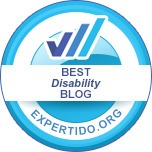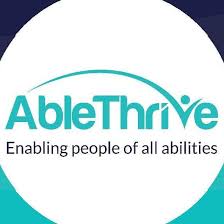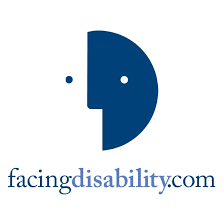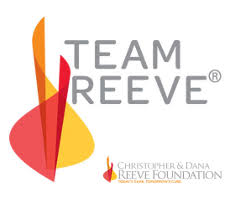|
I loved being home in Ohio, but the thought of Beth in Massachusetts made me sad, even though I knew she could handle living independently with her disability. I missed her.
We had been a team for four years. I hit a snag with an incompetent clerk and a new prescription for her medical supplies. With a fast-dwindling supply, I called the company again. I made the effort to be nice—at least the first several calls. Then, I asked to speak to the clerk’s supervisor and she refused. I lost my temper and started over with another supply company, finally arranging an overnight delivery to Beth at our expense at the last minute. My sadness amplified the normal day-to-day stress of my job. With elevated headache pain, I had trouble sleeping at the group home. I barreled through more weeks with unpaid overtime hours. Often on the verge of tears, I talked to John and let him convince me the stress of the manager job wasn't worth the money. Looking back, I could have ridden it out. Holidays were always the hardest time of the year to staff group homes. So instead of quitting my manager job in November, before Thanksgiving and Christmas, I decided to be considerate of the residents and other staff by leaving early in the New Year, almost three months away. I turned in my notice, relieved the end was in sight, and focused on setting things in order for the next manager. I talked to Beth on the phone after she finished a 2,400-yard workout in one practice: 96 lengths in the 25-yard pool, almost a mile and a half. Swimming that distance had not been possible a year before. As college competitions began, Beth would compete at all home meets at Blodgett pool as an official member of the Harvard Women’s Swimming and Diving (HWSD) team. Always too-busy, she appreciated the extra time she would gain by not traveling to away meets with the team. I wished I could have been there for the first home meet of the season in mid-November. Beth dropped fifteen seconds in the 100 free compared to her first Harvard meet ten months before! And reset two of her short course American Records. “She's probably one of the easiest people to coach in the sense that she always has a smile on her face, she's got a great positive attitude, and she's willing to try anything,” HWSD Coach Morawski said. “And she just kept getting faster and faster.” “For her to make that commitment to coach me and, this year I’m on the roster, is really important,” Beth said. “It’s been great. I love it!” Next: Together in Minneapolis!
8 Comments
My first day as manager of a Tiffin, Ohio group home, I trained to administer meals to a resident with a feeding tube, followed by me training other staff. I liked the four men who lived at the home, and knew two of them from when I worked at the local institution. I worked 24-hour shifts, 3pm to 3pm, often three in a row. It simplified staffing the overnight hours, but challenged me, mentally and physically. Sleeping well at the group home rarely happened. I scrambled to get up to speed on preferences, goals, routines, behavior plans, staff scheduling, meal planning, grocery shopping, outings, medications, paperwork, and new state requirements. On my days off, I was on call.
The day-to-day responsibility for the health and welfare of four men was daunting. The men attended the county workshop for adults with developmental disabilities on weekdays. Ideally, that time would be used for administrative planning and paperwork. Instead, since the residents had multiple health issues, weekdays often included taking one of them to a doctor’s appointment. I learned complicated medication regimens, as well as scheduling regular appointments, ordering refills, and making sure all staff documented every small thing, every day, in the correct way. I often drove to the group home on my days off for at least a few hours, just to keep up. My agency's new quality control supervisor visited one weekday morning after the men boarded the workshop bus; she had been the manager before me of the same home. She pointed out missing papers in the resident binders, which I was aware of. I regret not being more assertive. I wish I’d spoken up and showed her my long to-do list that included the missing items. Papers she neglected to obtain as the previous manager. Instead, I stewed. Next, my agency’s director made a counterproductive decision about a resident’s behavior plan by caving in to pressure from a resident’s family. I typed up evidence to support a better approach, to avoid dependence on a walker he didn’t need. I met with the director to plead his case, to no avail. Later that day, the same resident threw a tantrum near midnight. Following the new behavior plan, I had to encourage him to use the walker by his bed on the way to the bathroom. He didn’t need one. The ill-advised plan guaranteed more acting out, increased dependency, and needless frustration all around. When his loud yelling finally ended, I poked my head into the other bedrooms to reassure and quietly tell the other residents everything was okay. Good intentions, bad outcome. The youngest resident thought my intrusion meant it was time to get up, so he jumped out of bed and started his morning routine. My attempts to explain and redirect irritated him. Nonverbal, he insisted on changing clothes and sat at the kitchen table in the dark. I tried to reason with him, saying it wasn’t time for breakfast. Agitated, he tried to tip over the table and would have succeeded, except the home had an unusually huge and heavy one. When he calmed down a bit, I brought him a bowl of his favorite cereal with milk. He finished and sat in his rocking chair in the living room, still angry. I kept him company while I wrote out the required incident reports. Next: A Difficult Decision! (This blog tells my family's story. To see more, click "blog" at the top of this webpage.)
As Beth’s sophomore year at Harvard began, we lived far apart for the first time. I bridged the 725 miles between Cambridge, Massachusetts and Tiffin, Ohio with phone calls, emails, and care packages. I also tried to help from a distance, to free up at least a little of Beth’s time for more important things, even though we both knew she could do everything she needed to by herself. I made travel plans for upcoming Paralympic swim meets. I responded to requests for details for newspaper articles and updated her resume for a reporter. I started a Challenged Athletes travel grant application for her and she finished it, adding her personal goals and the essay. I ordered medical supplies and wheel bearings, When she needed a new bag for the back of the wheelchair, I researched options, emailed her the best ones, and bought the one she selected. Beth took over repairs for her wheelchair, scheduling a service to come to her dorm only after the intermittent catching of one wheel progressed to a consistent and frustrating obstacle. Her dirty laundry piled up until she couldn’t find clean clothes to wear. Her priorities filled her days: swim training, classes, homework, volunteering, mentoring—and sleep. Grateful to be home, I reconnected with the rest of my family. John and I visited Ben in Columbus. John taught 3rd graders while Maria attended Heidelberg College full-time, worked at a video store, and led college tours, in addition to babysitting. She sang in the college choir and show choir. Maria also solidified her plan to move to the Boston area after she graduated early, in December of the following year. She had a double major in elementary education and special ed. Always busy, she wasn’t home much except to sleep, but we found times to meet at Taco Bell to catch up over burritos and sodas. I loved my suddenly wide-open life, but I also felt the need to get a job to help with finances, even though John never pushed me to work outside the home. Without a college degree and with little opportunity in our small town, I had few options. Any minimum wage job would limit me to a very low income. I thought about working at the Tiffin Center again, a state job and my highest wage option. However, John might retire after the next school year, which meant we might relocate. It wasn’t fair to the residents to purposely work at the center for a short time. Plus, the thought of starting over again in direct care in the most difficult module was daunting. Working at a group home could be difficult, too, but seemed a bit easier and more flexible than the Tiffin Center. I decided to bite the bullet and manage another group home for the same agency I worked for earlier. Before accepting, I toured the Tiffin home, a modern duplex in good condition. The physical environment was a big improvement over the dilapidated house I had managed before. I said yes. I wish I had said no. (This blog tells my family's story. To see more, click "blog" at the top of this webpage.)
As Beth’s second year of college began, I helped her move into Pforzheimer House in the Quad where she’d live for the next three years. The irony of a quad (quadriplegic) living in the Quad did not escape us. My trek to the basement storage room to uncover her belongings proved dangerous. A few months before, I could reach everything in the room. Since then, students packed the entire room to the ceiling. I climbed shaky heaps and shifted furniture. A student helped me grab the heavy lift chair off the floor and over more piles. I was lucky to recover Beth’s things undamaged. In her second floor dorm room, I hung Maria’s sunflower quilt on the wall from an old-fashioned picture rail molding. I stocked Beth’s mini fridge and bought boxes of Cheez-its. She shared a three bedroom, one bath suite with two quiet friends, both future doctors with pre-med majors. They studied most of the time, like she did. I slept on her futon for two nights until a sad drive transported me away from Beth. I should have been grateful that she no longer needed me close by, but the separation hurt. If I lived alone near Harvard for another school year and worked three jobs, sharing a dingy apartment would not be fun. Even so, I wished I could be in two places at once. With no assistant or mom down the street, Beth selected biology as her major, a concentration in Harvard-speak, and spent part of her days in the science labs with ongoing physical challenges with the equipment. She usually chose to wheel the mile to and from her labs and classes. She led conference calls for the National Youth Leadership Network, in addition to mentoring. Every Friday, she rode the subway into Boston. “I directed a volunteer program that mentored students in special education classrooms in Boston Public,” Beth said. She also expanded the program to a second school. “We visited classrooms every Friday and took the students on field trips.” Beth depended on the early morning shuttle to get to swim practice, with over two miles between her dorm and the pool. She operated the pool’s chair lift independently to get in and out of the water. It was her first year on the roster of the Harvard Women's Swimming and Diving team. She entered the locked varsity locker room by pressing numbers on a keypad. Easy, compared to handling the heavy doors of the building. She found signs and little gifts at her assigned locker from her secret sis. One morning, she had a new adhesive hook near her locker for her towel, since she couldn’t reach the high hooks. She no longer had to leave her towel at the bottom of her locker. Strong team bonds formed a community that depended on each other. “I made amazing friendships,” Beth said. She joined the rest of the team for scheduled workouts in a weight room. She knew what to do. Coach Peggy had created a personalized workout for her on laminated flip cards. Beth figured out how to hold traditional weights with uncooperative hands, and used stretch cords with loops for handles and heavy medicine balls. The team often swam after the weight room. Nothing if not persistent, Beth put on and positioned her swim cap, by herself. . . . After three years of trying and failing to achieve the task. (This blog tells my family's story. To see more, click "blog" at the top of this webpage.)
Back home after our Norway trip, Beth bought the new Harry Potter book, The Half-Blood Prince. I didn’t need to wait long to read her copy. During a family trip to Columbus to see Ben, we watched Murderball, a documentary about the remarkable U.S. Paralympics quad rugby team that competed in Athens, Greece. Rugby was an aggressive sport with frequent injuries, and caught Beth’s interest when a friend invited her to use his special rugby wheelchair at a Columbus practice. Ben volunteered to pick her up off the court floor when she got knocked out of the chair. I loved to hear them laugh. Coach Peggy vetoed Beth's plans to participate in a rugby practice, and also the sit skiing she wanted to try. Peggy reminded her that broken bones would derail her freestyle and Beijing goals. Beth technically could swim with a broken leg, with no cast, but the increased spasms would slow her down. “Peggy is immensely caring,” Beth said, “and she thrived on the challenge of coaching me in a new way.” In late July, I flew with Beth and Peggy to Portland, Oregon for a rare national meet at an outdoor pool. Swimming under the hot sun meant the few with quadriplegia contended with fevers, since their body temperatures couldn’t regulate normally. Despite a rising body temperature, Beth earned American Records in the 200 free and 50 back. She would’ve added another in the 150 Individual Medley (IM) except for an uneven touch at the ending wall. A disqualification. Beth’s right hand bent into a fist more than the left, so Peggy started the paperwork to apply for an IPC exception. In Portland, no other S3 women competed. This meant Beth couldn’t see swimmers on either side of her during races, since faster swimmers with higher-numbered classifications quickly moved out of her sight at the start. After a race, a reporter asked about her decision to give up the spot she earned for the Athens Paralympics. “I’m definitely not going to miss out on China,” Beth said, “and have put myself on a three-year training schedule to qualify.” Between swim sessions, we drove the Columbia River Scenic Highway to picturesque waterfalls, with Mount Hood in the distance. Beth and I recalled the view of Mount Rainier where her swimming journey started. We wondered where we would be if we hadn’t gone to Seattle—where Beth set big swimming goals, and where we saw the unusual billboard with the caption, “Quadriplegia at Harvard: A+.” Next: Back to Cambridge for Year 2! |
Cindy KolbeSign up for my Just Keep Swimming Newsletter by typing your email address in the box. Thanks!Categories
All
Archives
November 2022
|
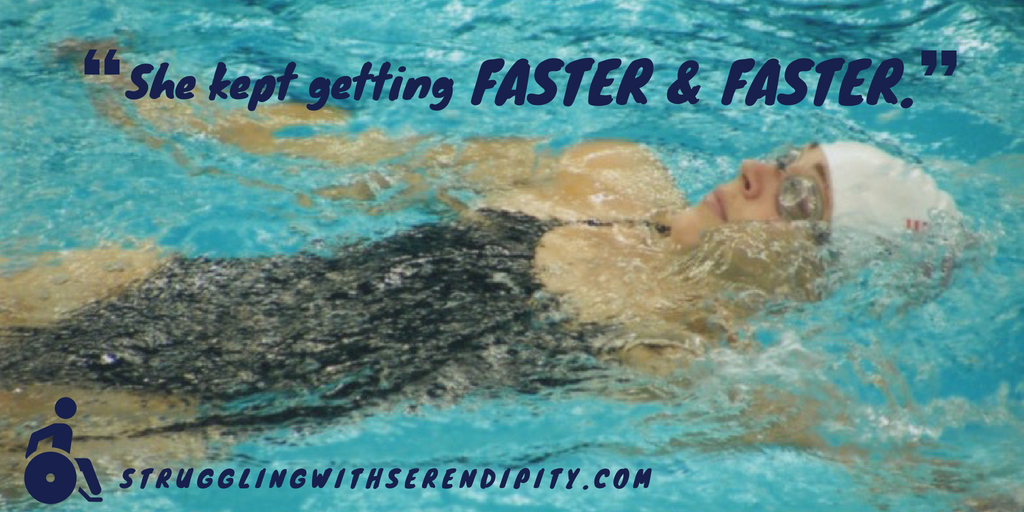
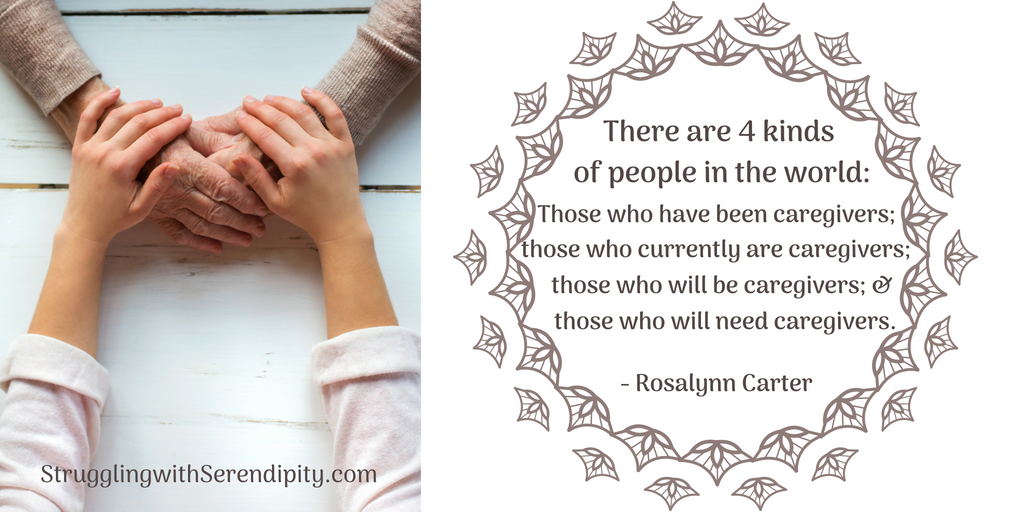

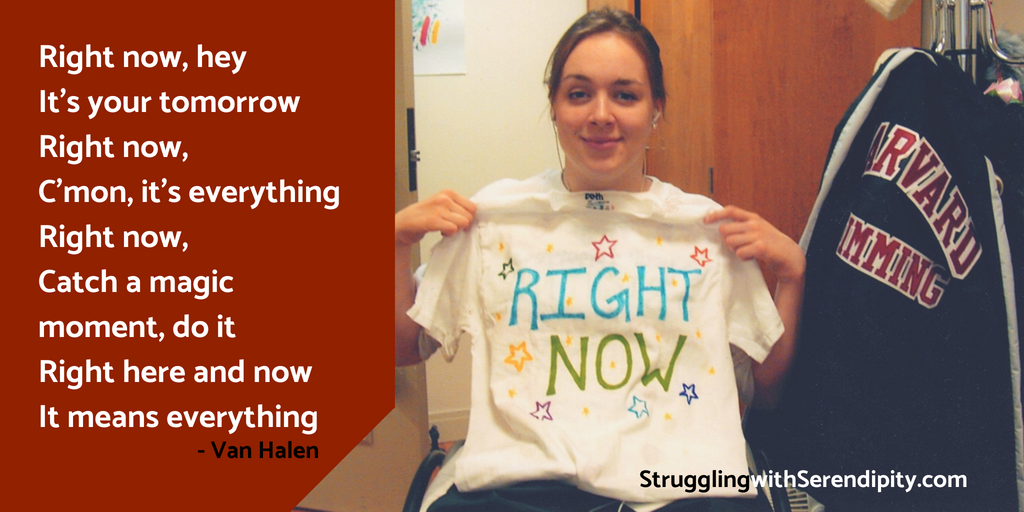


 RSS Feed
RSS Feed
